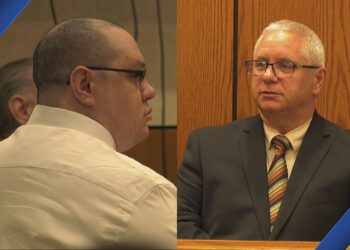LANSING, Mich (WZMQ) – The Clean Energy and Jobs Act has been passed, with amendments in the Michigan House Energy, Communications, and Technology Committee. The bill package would hand zoning responsibilities over to the Public Service Commission in Lansing, and some lawmakers have voiced concerns about taking power away from local authorities.
During this week’s committee meeting, the legislation was voted on and passed, 9 to 7, down party lines.
Last week, Representative Jenn Hill said major changes would need to be made in order for her to support the legislation. During the committee hearing, she proposed two amendments she says address her concerns.
“I asked the question last week of the Public Service Commission Chair, what is the definition of public benefit?” Representative Hill said. “Because as we have heard today, there’s a lot of concern that what is being proposed will not, in fact, benefit communities.”
U.P. Representative Jenn Hill proposed two amendments to the bill which outline what public benefits must be provided to local parties involved in a project, and secure funding for them. Even with the amendments, Representative Dave Prestin said he doesn’t think the bill does enough to protect local authority.
“Michigan wants to turn that control over to MPSC (Michigan Public Service Commission) central planning, Lansing-based central planning.” Representative Prestin said. “Solar siting wind siting, everything is going to be at the purview of the MPSC, there will be no way that the locals can oppose it.”
Representative Hill released this written statement to WZMQ:
I understand the concern local government officials have about these changes. I was careful to ensure that everyone at the local level will continue to have a voice in the decision process. Not only will locals have access to participate in these decisions as intervenors, but they will receive the funding they need to support their participation in the process. That funding was specifically requested by critics of the bills, and I insisted on its inclusion. I would not have been able to support the bills if my amendment had not been adopted.
-Representative Jenn Hill, 109th House District
My other amendment to the bills was designed to ensure that the Michigan Public Service Commission has clear guidance they must follow in determining whether new developments will serve the public.
I believe without a doubt that these bills have enormous potential to benefit the Upper Peninsula and its communities. I entered public service because of my concerns about energy costs in the U.P., as our residents currently pay the highest rates in the continental U.S. As more and more families are priced out of living north of the Mackinac Bridge, it’s vital that we seek innovative ways to bring down costs and retain the families that make the Upper Peninsula so special. Renewable energy developments represent an indispensable opportunity to meet those goals. We have to find ways to work with renewable energy developers, and I believe this legislation will help with that. I continue to negotiate with the bill sponsors.
“Local control took a massive blow this week. At the end of the day, the MPSC, central planning down here in Lansing is going to be able to cite these massive projects wherever they want.” Representative Prestin said. “The bills introduced by Rep Hill are nothing but window dressing to legislation that already slams the doors on locals, and all of our local governments, all of our townships, are going to lose the authority to oppose any project that has to do with wind or solar across the board.”
The amended bill has now been sent back to the House floor, where it will most likely see a vote next Tuesday. If passed, the bill still has to work its way through the Senate before it can be signed by the Governor.
Public comment lat week 4 in support 3 opposed. This week, 15, all opposed
3 amendments were added, one to ensure willing entry into the contract’s “eminent domain”
2 from rep hill: one defining public benefit
“public benefits include, but are not limited to, expected tax revenue paid by the energy facility to local taxing districts, payments to owners of participating property, community benefits agreements, local job creation, and any contributions to meeting identified energy, capacity, reliability, or resource adequacy needs of this state. In determining any contributions to meeting identified energy, capacity, reliability, or resource adequacy needs of this state, “
Requiring compensation to local participants
“the applicant shall make a 1-time grant to each affected local unit for an amount determined by the commission” up to“ $75,000.00 per affected local unit and not more than $150,000.00 in total.”







